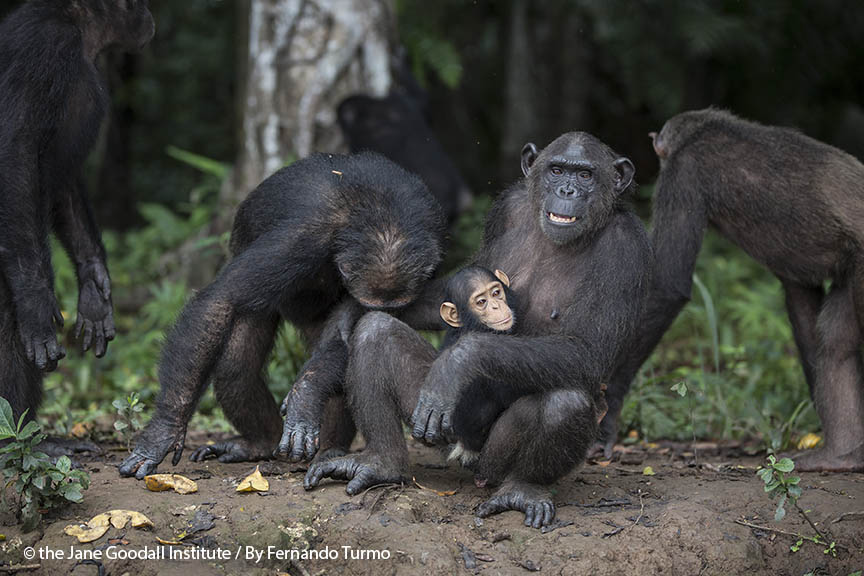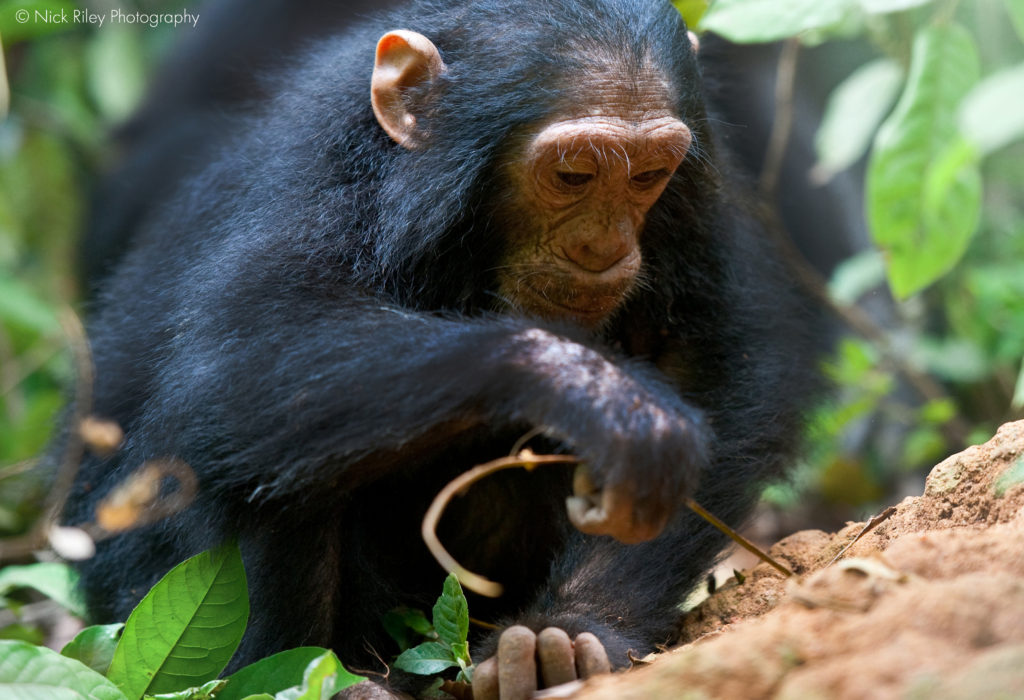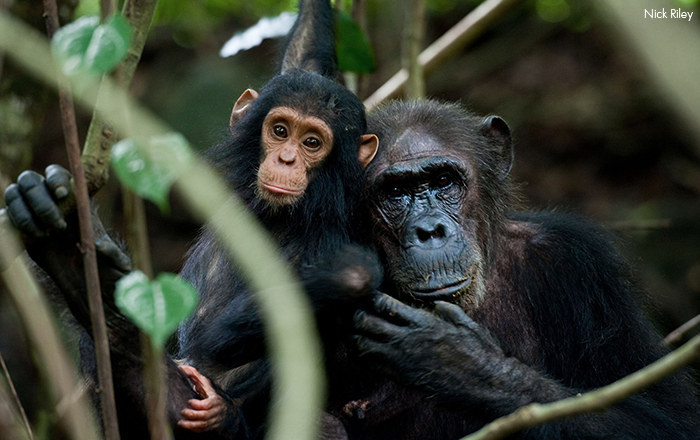When Jane Goodall first witnessed Gombe chimpanzee David Greybeard fishing for termites by manipulating blades of grass in 1960, the line between humans and other animals suddenly became blurry. Tool use was no longer uniquely human, leading Dr. Louis Leakey, Jane’s mentor, to famously say, “Now we must redefine tool, redefine man, or accept chimpanzees as human.”
We know that chimpanzees are our closest cousins in the animal kingdom, sharing 98.6% of our DNA. Chimpanzees are also known to exhibit remarkably human-like behaviors, such as grieving over the loss of a loved one, generating strategies to thrive in social groups, and even learning sign language.
But what allows us to share these things in common? Is it our brain structure, our shared genetic similarities, or our cultures? Turns out, it’s a mix of many things!
Chimpanzee Society
To start, it’s important to understand the chimpanzee “fission-fusion” social system. In this system, there are communities of up to 100 individuals that occasionally come together to eat, socialize, and mate, but spend most of their time in tighter sub-groups. Early human communities are thought to have lived in similar groups.

Strong alliances, bonds, and intrasexual dominance hierarchies between members make up most of the social dynamics in chimpanzee groups. Through these hierarchies, members of the same sex compete for access to resources such reproductive mates or food, resulting in alpha males and alpha females. Studies of human culture lead us to believe that we too operate with intrasexual hierarchies – just think about the famous myths in which men compete for the heart of a woman to become king!
Although males are dominant overall in chimpanzee groups, the most important relationships are between mothers and their dependent offspring, which we know largely thanks to studies initiated by Jane in the early 1960s. Chimpanzees learn essential life skills from their mothers, including how to pick up on emotional cues, be a good leader, and demonstrate compassion. Flo and Gremlin, for example, are two popular and outstanding chimpanzee mothers from Gombe. Gremlin persevered through the hard task of raising twins in the wild, and two of Flo’s sons grew up to become alpha males. Together, they showcase the importance of a strong mother-infant relationship – something humans need as well.
Chimpanzee Culture
Another thing that makes chimpanzees and humans remarkable is our culture, or all the learned traditions, behaviors, and values passed through generations. Because primates learn from other members in their social groups, different geographical populations of chimpanzees and humans exhibit predispositions to different behaviors, making groups culturally distinct from one another.

Although specific tool use and other learned activities are rooted in our sociality, it’s our large brains that help us to identify a problem and brainstorm a solution. Chimpanzees not only make tools to fish for termites, but also crack nuts open with specialized rocks and create rudimentary spears to hunt. This is made possible by a specialized neocortex region in our brains, allowing us to navigate using our environmental resources and each other to thrive.
Chimpanzee Brains
Beyond cognition-based activities alone, chimpanzees and humans are also unique in their self-awareness and emotional intelligence. We bond with others we care about through grooming, playing, and show aggression when upset. In the story of Gombe chimpanzees Flo and Flint (highlighted in the recent film JANE), the death of Flint’s mother Flo moved him into a state of deep depression, ultimately causing him to stop eating and tragically die himself. The similar emotional processing patterns of chimpanzees and humans are not only thanks to our complex sociality, but also to the structure of our brains. This includes the prefrontal cortex, hippocampus, amygdala, and more broadly the limbic system – our “emotional center”.

What do these insights mean for humankind?
Though much is shared between the two species, one thing that divides us is the scale of human destruction. In the past century alone, humans have become the main reason for chimpanzee numbers decreasing from 1-2 million to 300,000, and their extinction from four African countries. However, what also makes humans unique is our tremendous intellect – one of Dr. Goodall’s Reasons for Hope – which can solve even the biggest problems. That’s why the fight to protect chimpanzees, our fascinating neighbors perched next to us on the tree of life, is still worth fighting for.
Want to learn more about chimpanzee research and insights? Sign up for Gombe Science Heroes to learn more about ongoing research in Gombe and support the longest running wild chimpanzee study in the world! Get started today.

The Jane Goodall Institute is a global community conservation organization that advances the vision and work of Dr. Jane Goodall. By protecting chimpanzees and inspiring people to conserve the natural world we all share, we improve the lives of people, animals and the environment. Everything is connected—everyone can make a difference.






